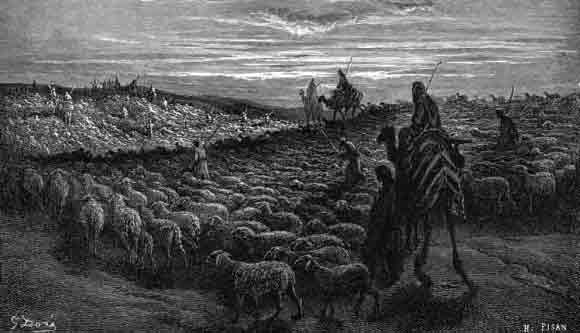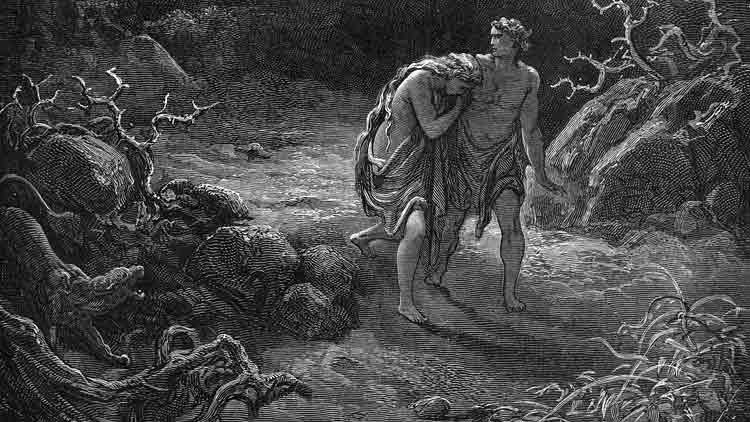(Genesis 12:1-3; Genesis 22:1-14; Romans 4:17-25)(The image is from the “Dore Bible Illustrations” that are available via Gutenberg Press. It is used legally.)
This morning we continue a series of sermons entitled, “Heroes of Faith.” We leave behind Adam and Eve and the prehistory of the World, and look at the prehistory of Israel. Israel had three great patriarchs, Abraham, and Abraham’s son Isaac, and Abraham’s grandson Jacob. This morning we look at Abraham who started life as Abram, and at Sarah, who started life as Sari.
It was the Apostle Paul who called Abraham, “the father of… all (who have faith).”(Romans 4:16 and Galatians 3:7).
It was a Madame Cornuel who lived in 17th century France that made the often quoted remark, “No man is a hero to his valet.” Not only does a man’s valet know that he gets up in the morning and puts his pants on one leg at a time, like any other man, a man’s valet is witness to a side of his master’s character that the world does not see.
The Scripture is at least as critical of Abraham as any valet would be. The Scripture tells us about Abraham’s good points and bad.
The Book of Genesis tells us that Abraham is rich in cattle, silver, and gold. However Genesis 13 reveals that Abraham is sadly lacking in character. It tells us that Abraham was forced to take his household down into Egypt because there was a famine in Canaan land. Abraham was afraid that his pretty young wife, Sarah, would draw trouble to him, so he cuddled up to her and said, “Honey, you are a real beauty. Would you mind too terribly if I told these folks that you are my sister instead of my wife? It will save my skin!” He did just that. And Pharaoh thought that Sarah was beautiful, and he took Sarah into his household. And if it had not been for the fact that God rained misfortune on Pharaoh because of Sarah, and then revealed to Pharaoh in a dream that Sarah was the cause of it, Sarah may have become “the Queen of the Nile” instead of a biblical heroine. I wonder if Abraham was Sarah’s hero after this episode?
The bible reports several other episodes involving Abraham that a valet would blush to tell.
The story of Abraham and his willingness to sacrifice Isaac is not one of them. This is a story that even the most faithful servant could not refrain from telling. Yet, it is this episode that may have prevented some of you from thinking of Abraham as a hero of faith. Abraham loved Isaac as the son of his old age; but, at one point, Abraham was ready to drive a dagger into Isaac’s heart, simply because God told him to do it!
Now the first question that people ask when they hear this story about Abraham and Isaac is, “Why in the world would God ask Abraham to do such a thing?”
I have had more than one dedicated, thinking Christian come to me with that very question. On another occasion, I had a woman walk out of church during the reading of the Abraham and Isaac story, never to return again, even though her husband attended faithfully for years afterward. Nevertheless, this first question is easy to answer. The answer is two fold.
On the one hand, God did it to test Abraham’s love for him. God had to know if Abraham were really the man who was worthy to be called “the father of all who believe.” That is in the text. It is hard but true. In Genesis 22:12 God said to Abraham:
“Do not lay your hand on the lad or do anything to him; for now I know that you fear God, seeing you have not withheld your son, your only son, from me.”
On the other hand, God did it so that God might prove once and for all that God is not a god who requires child sacrifice. Remember, child sacrifice was a common practice in Abraham’s day. All the false gods created by the mind of man demanded it. Only the One True God did not. I am sure that the story of Abraham and Isaac was told over and over again by generations of thankful Jews. And many a Jewish mother remembered it gladly as she clutched her newborn son or daughter to her breast and listened to her husband tell of how some Canaanite neighbor had just sacrificed yet another child to Baal. The true God does not demand child sacrifice; and, thanks to the story of Abraham and Isaac, people of faith have known it beyond a shadow of a doubt. (See Note 1:)
But now the hard question—the second question: “How in the world did Abraham ready himself to do such a thing?”
It is in the answer to that question that we discover the true heroism in the heart of the Abraham.
The answer is a five-letter word: F-A-I-T-H. And it is his F-A-I-T-H that made Abraham the man that he ultimate was. You see, God had promised Abraham that his descendants would be as numerous as the stars in the sky (Genesis 15:5). And God had promised Abraham that his descendants would not be named through Eliazer the slave that he had adopted, and they would not be named through Ishmael, the son of his concubine Hagar; but they would come through Isaac the son that his wife Sarah bore to him when he was 100 years old and she was 90 years old. (Genesis 17:19). On the morning that Abraham saddled his ass and assembled his servants and yanked Isaac from between the covers to head for a mountain in the land of Moriah, Isaac had not even started to notice girls. As yet he had no “seed.”
How did Abraham ready himself for such a deed? The Jewish rabbis who commented on this passage suggested two reasons: 1) Some of them said that Abraham was so sure of God and so sure of God’s promise that he believed God could raise Isaac from the dead, if need be, in order to fulfill God’s promise. This is echoed in Hebrews 11:19. (Note 2:) 2) Others, pointed to Abraham’s statement in Genesis 22:8 that God would provide the sacrifice, and said that Abraham was confident along those lines. The point is, Abraham was somehow able to obey God and to leave the results with him.
Abraham, like many of us, had a shaky beginning with God; but no man (with the exception of Jesus) ever had more faith in God than Abraham. That is what makes Abraham a “hero,” and that is why we call him “the father of all who believe.”
Now, how do we respond to this heroism?
In may be that we respond as Soren Kierkegaard did after reading this story. S.K. said:
“Abraham I cannot understand, in a certain sense there is nothing I can learn from him but astonishment.”
That is absolutely true. When you and I hear the story of Abraham and Isaac, we do not even pretend to aspire to a faith just like Abraham’s. Elayne and I just drove 1,600 miles to see our new granddaughter. After seeing her we would have driven 5,600 miles to see her if necessary. Yet the love that we have for her is but a fraction of the love that her parents already have for her. We are absolutely convinced that should God call upon the parents of today for such a cruel test, we would reject God wholesale. That is o.k. You and I are not called upon to be the father or the mother of all who have faith. And we are not called upon to be the one through whom God mediates his message against child sacrifice. We are only called upon to be “children of Abraham,” and follow his lead of faith.
So, do we stop with a relationship, or should we try to emulate Abraham in some way?
There are things in Abraham that we would do well to imitate. I would mention two.
1. We can imitate him in Abraham’s willingness to abandon the security of the familiar for the adventure of the unknown.
In Genesis chapter 12 God called upon Abraham to go from (his) country and (his) kindred and (his) father’s house to a land that he would show him. And God promised Abraham a land, a seed, and a blessing for his obedience. And Abraham went out in obedience to God, not knowing where he was going.
In commenting on the faith of Abraham, Oswald Chambers says, “Being a Christian means a continual going out.” Sometimes we are called to go out physically. We leave our country, our kindred, our father’s house to go to some place where God calls us to go, like a missionary going into a foreign land. Sometimes are called upon to go out spiritually. We are called to go out of familiar and comfortable ideas and creeds and theologies in order to be true to Jesus Christ. As the man said, “It is often easier to be faithful to our convictions and our creed than it is to be faithful to Jesus Christ. “
I know this from personal experience. When I was first went to seminary I used to pray that God would give me the spiritual gift of prophecy. Then I went to my first church and I would gladly have claimed any spiritual gift but prophecy. I came to see that Jesus was right: “No prophet is accepted in his own country.” (Luke 4:24) All the great prophets of the Bible, like Abraham and Moses and Isaiah and John the Baptist and Jesus and Paul, lived during times of great change. God called upon them to lead people into a new spiritual truth, and they paid the price for it. Jesus paid with his life when he came as a suffering Servant, for no good Jew could imagine a Messiah who suffered. And Paul’s biggest battle was over circumcision, whether or not people could become followers of Jesus Christ without first becoming Jews.
When I was in Boston I prayed the prayer for my granddaughter Caroline that I pray for all our children. I prayed that, in every dimension, she might be as beautiful as she was in the mind of God when God first thought of her, and that every good possibility of life might become a reality for her as she follows Jesus Christ. Do we want to be as beautiful as we were in the mind of God when he first thought of us? Do we want to see all of God’s plans for us fulfilled? It will never happen unless we are willing to go out of all that is secure and comfortable to risk the unknown, and so discover the breadth and length and height and depth of the God who reveals himself in Christ.
A.W. Tozer the great Christian Missionary and Alliance preacher once said that, in order to be all that God wants for us to be and to claim all that God has for us, we must place two bundles upon his alter: 1) the bundle of the known—and 2) the bundle of the unknown. In other words, we must be willing to abandon what we think we want to be for what only God knows can be.
This takes courage. The Commanding General of the 2nd Marine Division has a personal launch to be used during an amphibious landing or assault. It is named, “Follow me.” That is what Jesus said to his first disciples, and that is what Jesus says to us: “Follow me.” It often takes more courage for a Christian to follow where God leads than it does for a soldier to follow his general into battle.
Now here is the good news. We don’t have to have all the courage we will need on our journey with God at the beginning of that journey. Abraham did not have it in in the beginning of his journey. He was so fearful he was willing to give his own wife into the hands of another! What we need is enough courage to take the next step. Abraham prepared to sacrifice Isaac, and God provided a lamb for the sacrifice. If we take the next step, God will provide the thing that will give us the courage for the step after that.
We cannot become a Hero of Faith like Abraham over night, but we can continue Abraham’s journey this very morning. We do that when we say:
“God, here I am, surrounded with the familiar. Nevertheless, I stand prepared to follow you into the unfamiliar, into territory where I have never set foot before. I am stepping, Lord, I am stepping!”
2. Finally, we can imitate Abraham in thinking that God is great enough and powerful enough to keep His promises.
God promised Abraham a child when he was 99. And Abraham became a father at 100. God promised Abraham that his descendants (and Isaac’s )would be as numerous as the stars in the sky. Perhaps Abraham believed that God could raise Isaac from the dead, if necessary, to keep that promise. Abraham certainly believed that God would provide him with a sacrifice. You and I must believe something almost as difficult. We must believe that all of human history is still under God’s control, still moving toward the accomplishment of God’s purpose. More than that, we must believe that God will keep God’s promises for us as individuals. We must believe that God is bigger than the loss of someone we love, cancer, heart disease, the war on terror, Aids, pollution, the lost of our livelihood, the changes in society, and unbelief itself. More than that, we must believe that if only we will have faith, God will accomplish God’s purposes for us. We have introduced many detours into the journey that God planned for us, yet we must believe that, if we will allow it, God can overcome those detours and bring us to the place and purpose that God had planned for us all along.
The poet Sidney Lanier once watched as a Marsh Hen built her nest as all Marsh Hens have always built their nests—-on the marsh. It seems a foolish place, but that is where the Marsh Hen thrives and all Marsh Hens that want to thrive must do as all successful Marsh Hens have always done. And then Sidney Lanier thought about building a nest for himself, a nest of faith, and then he wrote a poem about it. One stanza reads:
As the Marsh Hen secretly builds on the watery sod,
Behold, I will build me a nest on the greatness of God;
That’s it! We may doubt the muscle in our faith. That’s o.k. If we trust God enough to make the next step in our journey, we will, like Abraham, “grow strong in faith,” as God supplies the strength we need for the step after that. After all, faith is like a muscle. The more we exercise it, the stronger it gets.
Finis
Worth Green, Th.M., D.Min.
(Note 1:) There is a parallel situation in the Law of Moses. In Exodus 13:1 The LORD said to Moses, 2 “Consecrate to me all the first-born; whatever is the first to open the womb among the people of Israel, both of man and of beast, is mine.” The first-born belongs to God. However, Exodus 34:20 allows for the redemption of the first-born:
Exodus 34:20 The firstling of an ass you shall redeem with a lamb, or if you will not redeem it you shall break its neck. All the first-born of your sons you shall redeem. And none shall appear before me empty.
(Note 2:) Hebrews 11: 19 (Abraham) considered that God was able to raise men even from the dead; hence, figuratively speaking, he did receive him back.










